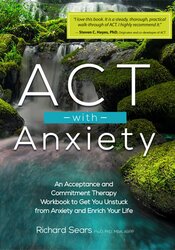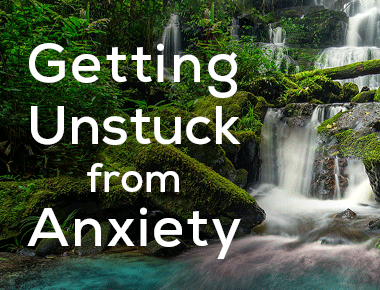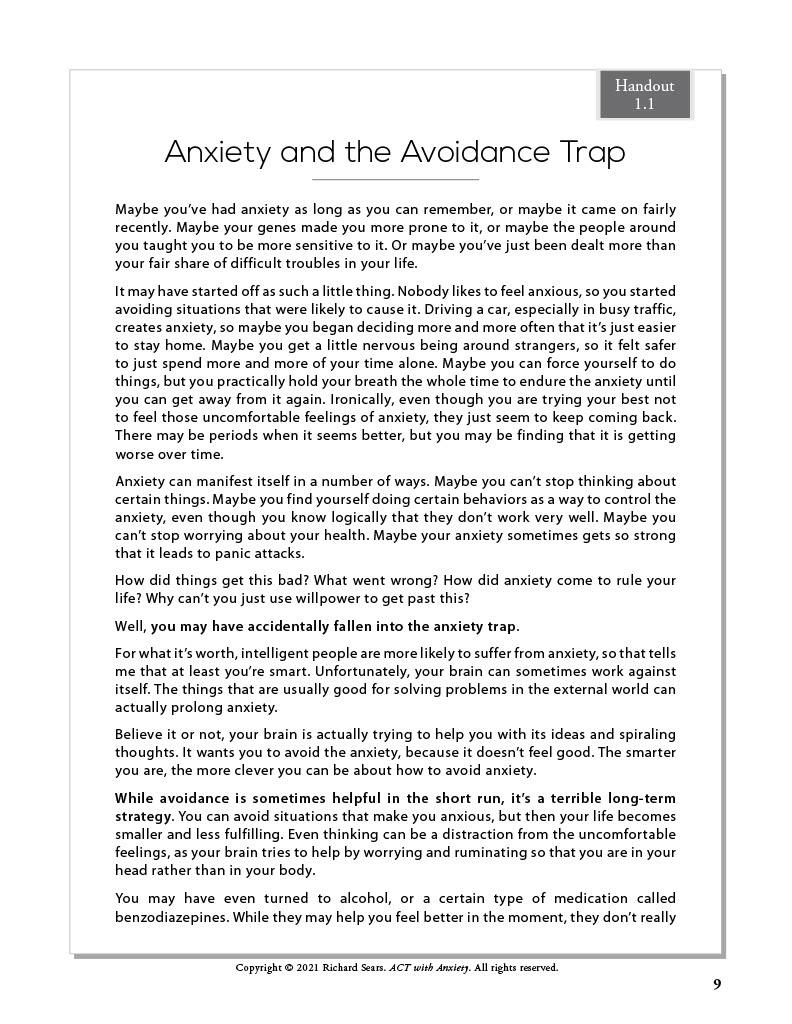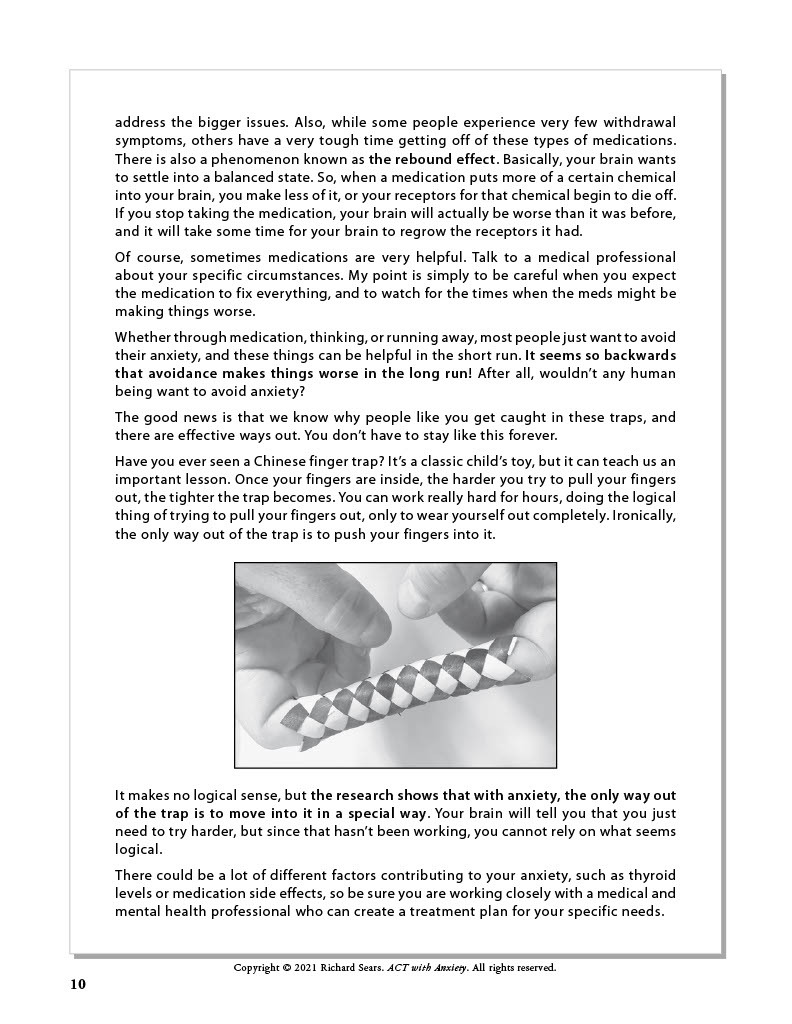Getting Unstuck from Anxiety
Introducing Richard Sears’s newest book: ACT with Anxiety

Many people inadvertently get caught in patterns of avoiding or distracting themselves from anxiety. While fine when done occasionally as self-care, constant avoidance can lead to getting stuck in long-term patterns of struggle.
Acceptance and Commitment Therapy (ACT) is based on the research of change processes, and six key areas have been identified that are crucial to get “unstuck.”
Connecting to a Bigger You
Instead of identifying yourself with your anxiety, you can practice remembering that you are a whole lot more than your anxiety. You may have a lot of problems, but you are not your problems. You may have anxious thoughts, but you are not your thoughts. You may have anxious feelings, but you are not your feelings. You are the one having those experiences. If you can have thoughts, emotions, or problems, you must be bigger than them.
You are more than anything you can say you are in words. You may be a child, a parent, a sibling, an employee, an athlete, a partner, and play all kinds of other social roles. Yet, there is a bigger you that has learned to play all these roles.
You also have a history. You were once a baby, a child, a teenager, a young adult. There is a thread that connects all those you’s, a bigger sense of yourself that has witnessed the experiences that have occurred over all those years. That you is much more than the anxiety you are feeling right now.
When you remember that you are much more than anxiety, you become less stuck in it.
Thoughts are Not Reality
The word “water” represents a liquid reality, but you can’t drink the word “water.” A menu represents food, but you can’t eat it. Likewise, our thoughts can be useful to represent reality, but they aren’t reality. They are only sounds inside our heads.
With practice, you can learn to recognize that your thoughts are just thoughts. Sometimes they are useful, but there is no need to fight with them. After all, if you argue with yourself, who ends up losing?
When you learn to let go of the battle with your own thoughts, you free up a lot of energy to engage with more important things.
Acceptance of Reality and Your Feelings
Your anxiety has probably created a lot of problems in your life. It has likely robbed you of a lot of opportunities. I’ll bet it’s had a big impact on your work and your relationships. It’s not fair. You don’t deserve this. It shouldn’t be this way.
That is all true, but unfortunately, wishing things were different hasn’t changed anything. The reality right now is that you suffer from anxiety.
We waste a great deal of effort and energy fighting reality. When we learn to accept reality as it is, we free up a lot of energy, and become more flexible in how we deal with things.
This reality may include feelings of anxiety. A lot of us are taught, “I can’t feel that way. I’ve got to distract myself. I’ve got to fight it.” You probably wouldn’t scream at a child or a friend for having anxiety. It’s a natural feeling. Anxiety comes with being human. You can learn to let yourself have the anxiety, even if it is uncomfortable, if it is already here anyway. You don’t have to fight or try to control your own emotions all the time.
You may not like the emotions you are having, or reality as it is, but it is hard to deal effectively with reality if you do not accept it.
Awareness in this Moment
Contact with the present moment, or mindfulness, is essential to getting unstuck. The moment you are in—right here, right now—is the only time that you are ever going to be able to experience anything or take action. However, a lot of us live in our heads, off somewhere in the future or in the past. While that can sometimes be useful, to live a fulfilling life, we need the ability to be present in our experiences. To work with challenging situations, we need to bring our attention to our senses, thoughts, feelings, and habits. Just as we can strengthen our muscles through physical exercise, we can strengthen our attention and presence with mindfulness exercises.
In a very real sense, this moment is all that exists, so it’s an important place to be. Everything else is only in your mind.
Keep in Mind What Really Matters
What is important to you? What really matters in your life? What is your anxiety getting in the way of?
Anxiety can seem so huge, and our problems can seem so big, that they become the focus of our lives. While our problems can definitely be important, if we lose perspective, we forget what life is really about. Getting in touch with your values means connecting with what is important to you. Of course, no one can tell you what your life values should be. You need to find out for yourself, or perhaps rediscover it for yourself.
If you have a reason to change things, you will be more willing to do the work.
Committed Action
This may sound obvious, but if you want things to be different, you have to do something different. Just thinking about it is not enough. Once you know where you want to go, it is important to set goals to get there. People sometimes talk about change for years, and no change ever happens. Action is needed to make changes in one’s life.
Because big changes can seem daunting, you can begin with small, concrete steps that take you toward what matters, even if you are feeling anxious. If you value health, you can go take a five-minute walk. If you value family, you can write a note telling a loved one something you appreciate about them.
Learning More
If you are interested in learning more about your anxiety and how to live a rewarding life with it, check out Richard’s newest book, ACT with Anxiety: An Acceptance and Commitment Therapy Workbook to Get You Unstuck from Anxiety and Enrich Your Life, to continue your journey.
As a bonus for you, we have gathered some free sample worksheets for you to use with yourself or with your clients. Try the handout below, then download the other free resources to get a preview of all the great content Dr. Sears has compiled over his years of practice and expertise.
Acceptance and Commitment Therapy (ACT) is based on the research of change processes, and six key areas have been identified that are crucial to get “unstuck.”
Connecting to a Bigger You
Instead of identifying yourself with your anxiety, you can practice remembering that you are a whole lot more than your anxiety. You may have a lot of problems, but you are not your problems. You may have anxious thoughts, but you are not your thoughts. You may have anxious feelings, but you are not your feelings. You are the one having those experiences. If you can have thoughts, emotions, or problems, you must be bigger than them.
You are more than anything you can say you are in words. You may be a child, a parent, a sibling, an employee, an athlete, a partner, and play all kinds of other social roles. Yet, there is a bigger you that has learned to play all these roles.
You also have a history. You were once a baby, a child, a teenager, a young adult. There is a thread that connects all those you’s, a bigger sense of yourself that has witnessed the experiences that have occurred over all those years. That you is much more than the anxiety you are feeling right now.
When you remember that you are much more than anxiety, you become less stuck in it.
Thoughts are Not Reality
The word “water” represents a liquid reality, but you can’t drink the word “water.” A menu represents food, but you can’t eat it. Likewise, our thoughts can be useful to represent reality, but they aren’t reality. They are only sounds inside our heads.
With practice, you can learn to recognize that your thoughts are just thoughts. Sometimes they are useful, but there is no need to fight with them. After all, if you argue with yourself, who ends up losing?
When you learn to let go of the battle with your own thoughts, you free up a lot of energy to engage with more important things.
Acceptance of Reality and Your Feelings
Your anxiety has probably created a lot of problems in your life. It has likely robbed you of a lot of opportunities. I’ll bet it’s had a big impact on your work and your relationships. It’s not fair. You don’t deserve this. It shouldn’t be this way.
That is all true, but unfortunately, wishing things were different hasn’t changed anything. The reality right now is that you suffer from anxiety.
We waste a great deal of effort and energy fighting reality. When we learn to accept reality as it is, we free up a lot of energy, and become more flexible in how we deal with things.
This reality may include feelings of anxiety. A lot of us are taught, “I can’t feel that way. I’ve got to distract myself. I’ve got to fight it.” You probably wouldn’t scream at a child or a friend for having anxiety. It’s a natural feeling. Anxiety comes with being human. You can learn to let yourself have the anxiety, even if it is uncomfortable, if it is already here anyway. You don’t have to fight or try to control your own emotions all the time.
You may not like the emotions you are having, or reality as it is, but it is hard to deal effectively with reality if you do not accept it.
Awareness in this Moment
Contact with the present moment, or mindfulness, is essential to getting unstuck. The moment you are in—right here, right now—is the only time that you are ever going to be able to experience anything or take action. However, a lot of us live in our heads, off somewhere in the future or in the past. While that can sometimes be useful, to live a fulfilling life, we need the ability to be present in our experiences. To work with challenging situations, we need to bring our attention to our senses, thoughts, feelings, and habits. Just as we can strengthen our muscles through physical exercise, we can strengthen our attention and presence with mindfulness exercises.
In a very real sense, this moment is all that exists, so it’s an important place to be. Everything else is only in your mind.
Keep in Mind What Really Matters
What is important to you? What really matters in your life? What is your anxiety getting in the way of?
Anxiety can seem so huge, and our problems can seem so big, that they become the focus of our lives. While our problems can definitely be important, if we lose perspective, we forget what life is really about. Getting in touch with your values means connecting with what is important to you. Of course, no one can tell you what your life values should be. You need to find out for yourself, or perhaps rediscover it for yourself.
If you have a reason to change things, you will be more willing to do the work.
Committed Action
This may sound obvious, but if you want things to be different, you have to do something different. Just thinking about it is not enough. Once you know where you want to go, it is important to set goals to get there. People sometimes talk about change for years, and no change ever happens. Action is needed to make changes in one’s life.
Because big changes can seem daunting, you can begin with small, concrete steps that take you toward what matters, even if you are feeling anxious. If you value health, you can go take a five-minute walk. If you value family, you can write a note telling a loved one something you appreciate about them.
Learning More
If you are interested in learning more about your anxiety and how to live a rewarding life with it, check out Richard’s newest book, ACT with Anxiety: An Acceptance and Commitment Therapy Workbook to Get You Unstuck from Anxiety and Enrich Your Life, to continue your journey.
As a bonus for you, we have gathered some free sample worksheets for you to use with yourself or with your clients. Try the handout below, then download the other free resources to get a preview of all the great content Dr. Sears has compiled over his years of practice and expertise.
Get access to even more helpful resources

Anxiety, in all its various forms, is one of the most common mental health challenges today. Although many of us attempt to deal with anxiety by pushing it away or trying to avoid it altogether, this often has the paradoxical effect of making it worse. Worrying sparks anxiety, and anxiety sparks more worrying, and our lives become smaller. Fortunately, new research reveals how to break free from the anxiety trap.
In this engaging and easy-to-read workbook, Dr. Sears provides detailed explanations, case examples, and practical worksheets to show you how to work with your anxiety instead of trying to battle against it. Using cutting-edge techniques and principles, you’ll learn tools to transform anxiety and create a richer and more fulfilling life.
In this engaging and easy-to-read workbook, Dr. Sears provides detailed explanations, case examples, and practical worksheets to show you how to work with your anxiety instead of trying to battle against it. Using cutting-edge techniques and principles, you’ll learn tools to transform anxiety and create a richer and more fulfilling life.
Meet the Expert:
Richard Sears, PsyD, PhD, MBA, ABPP, is a licensed psychologist in Cincinnati, Ohio, board certified in clinical psychology by the American Board of Professional Psychology (ABPP), runs a private psychology and consultation practice, and is the Director of the Center for Clinical Mindfulness & Meditation. He is also clinical assistant professor at Wright State University School of Professional Psychology, clinical/research faculty at the UC Center for Integrative Health and Wellness, volunteer professor of Psychiatry & Behavioral Neurosciences at the UC College of Medicine, and a research/psychologist contractor with the Cincinnati VA Medical Center.
His most recent books include: Cognitive Behavioral Therapy & Mindfulness Toolbox (PESI, 2017); Mindfulness: Living Through Challenges and Enriching Your Life in this Moment (Wiley-Blackwell, 2014); Perspectives on Spirituality and Religion in Psychotherapy (PR Press, 2014); Building Competence in Mindfulness-Based Cognitive Therapy (Routledge, 2015); and Mindfulness-Based Cognitive Therapy for PTSD (Wiley-Blackwell, 2016). Dr. Sears is lead author of Mindfulness in Clinical Practice (PR Press, 2011) and Consultation Skills for Mental Health Professionals (Wiley, 2005).
Dr. Sears is a fifth-degree black belt in Ninjutsu, and once served as a personal protection agent for the Dalai Lama with his teacher, Stephen K. Hayes. He has studied the Eastern Wisdom traditions for over 30 years, receiving ordination in three traditions, and has been given transmission as a Zen master.
Learn more about their educational products, including upcoming live seminars, by clicking here.
His most recent books include: Cognitive Behavioral Therapy & Mindfulness Toolbox (PESI, 2017); Mindfulness: Living Through Challenges and Enriching Your Life in this Moment (Wiley-Blackwell, 2014); Perspectives on Spirituality and Religion in Psychotherapy (PR Press, 2014); Building Competence in Mindfulness-Based Cognitive Therapy (Routledge, 2015); and Mindfulness-Based Cognitive Therapy for PTSD (Wiley-Blackwell, 2016). Dr. Sears is lead author of Mindfulness in Clinical Practice (PR Press, 2011) and Consultation Skills for Mental Health Professionals (Wiley, 2005).
Dr. Sears is a fifth-degree black belt in Ninjutsu, and once served as a personal protection agent for the Dalai Lama with his teacher, Stephen K. Hayes. He has studied the Eastern Wisdom traditions for over 30 years, receiving ordination in three traditions, and has been given transmission as a Zen master.
Learn more about their educational products, including upcoming live seminars, by clicking here.







